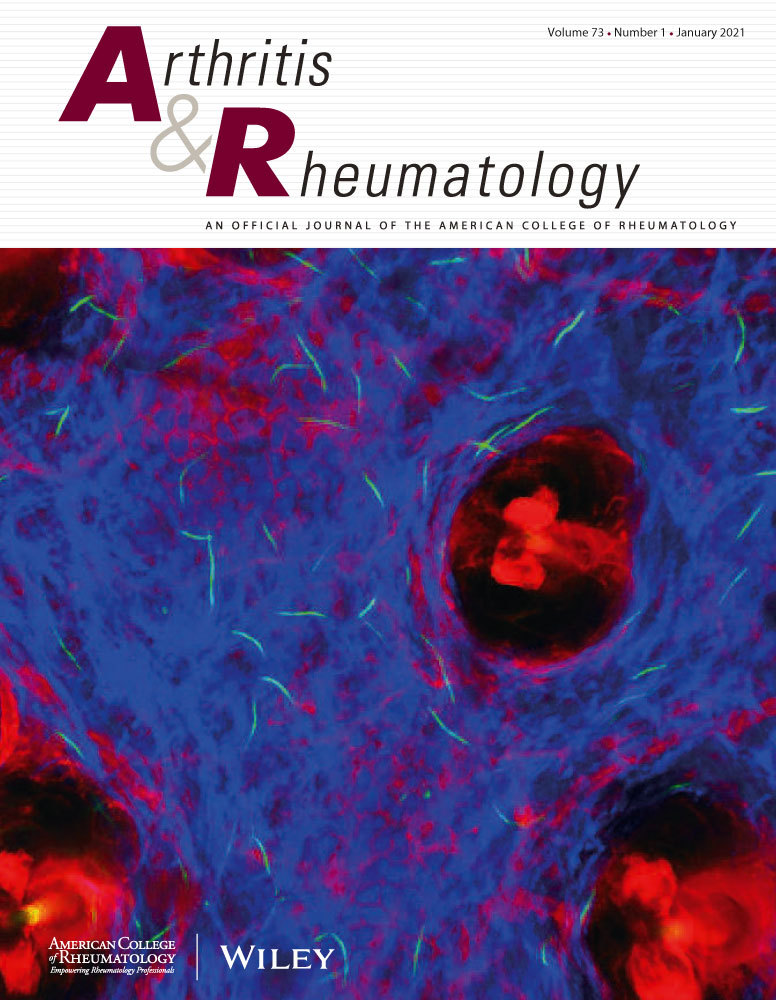ZBTB20调节出生后关节软骨发育和体内平衡:对早发性骨关节炎的影响。
IF 10.9
1区 医学
Q1 RHEUMATOLOGY
引用次数: 0
摘要
ZBTB20(一种转录因子)的突变与人类骨骺发育不良和关节变性有关。本研究探讨了ZBTB20在小鼠出生后发育过程中调节关节软骨生长和完整性的作用及其对早发性骨关节炎(OA)的影响。方法采用免疫染色法检测ZBTB20在关节软骨中的时空表达,并建立诱导性软骨特异性敲除ZBTB20小鼠模型。分析Zbtb20缺失对软骨厚度、带状组织、细胞增殖和凋亡的影响。我们采用组织学、Micro-CT、原位杂交、rna测序和CUT&Tag来评估每组6 - 8只雄性小鼠膝盖的结构和分子变化。使用公开数据集分析ZBTB20在人OA软骨中的表达。结果zbtb20在出生后发育和成人关节软骨细胞中均有表达。出生后Zbtb20缺失导致膝关节关节软骨进行性增厚,2月龄时增厚1.9倍,尤其是在深部和钙化区。伴有软骨细胞过度增殖和分化缺陷,导致6个月的早发性软骨变性。rna测序和CUT&Tag分析显示,ZBTB20直接调控软骨生长、软骨细胞分化和细胞外基质组织所必需的一系列基因。此外,ZBTB20在小鼠和人类衰老相关的OA软骨中的表达均显著降低,成人软骨中诱导缺失ZBTB20可导致小鼠严重的自发OA样变化。结论zbtb20对出生后关节软骨的发育和体内平衡至关重要,在衰老相关的OA进展中具有保护作用。本文章由计算机程序翻译,如有差异,请以英文原文为准。
ZBTB20 Regulating Postnatal Articular Cartilage Development and Homeostasis: Implications for Early-Onset Osteoarthritis.
OBJECTIVE
Mutations in ZBTB20, a transcription factor, are linked to epiphyseal dysplasia and articular degeneration in humans. This study investigates the role of ZBTB20 in regulating articular cartilage growth and integrity during postnatal development and its implications for early-onset osteoarthritis (OA) in mice.
METHODS
We assessed the spatiotemporal expression of ZBTB20 in articular cartilage using immunostaining and generated an inducible cartilage-specific Zbtb20 knockout mouse model. The impacts of Zbtb20 deletion on cartilage thickness, zonal organization, cellular proliferation, and apoptosis were analyzed. We employed histology, Micro-CT, in situ hybridization, RNA-sequencing, and CUT&Tag to evaluate structural and molecular changes in knees from six to eight male mice per group. ZBTB20 expression in human OA cartilage was analyzed using publicly available datasets.
RESULTS
ZBTB20 was expressed in postnatal developing and adult articular chondrocytes. Postnatal Zbtb20 deletion resulted in progressive thickening of articular cartilage in knees, with a 1.9-fold increase at 2 months of age, particularly in the deep and calcified zones. This was accompanied by chondrocyte overproliferation and differentiation defects, leading to early-onset cartilage degeneration by 6 months. RNA-sequencing and CUT&Tag analyses revealed that ZBTB20 directly regulates a broad set of genes essential for cartilage growth, chondrocyte differentiation, and extracellular matrix organization. Moreover, ZBTB20 expression was significantly reduced in aging-related OA cartilage in both mice and humans, and inducible deletion of Zbtb20 in adult cartilage resulted in severe spontaneous OA-like changes in mice.
CONCLUSION
ZBTB20 is essential for postnatal articular cartilage development and homeostasis, with a protective role in aging-related OA progression.
求助全文
通过发布文献求助,成功后即可免费获取论文全文。
去求助
来源期刊

Arthritis & Rheumatology
RHEUMATOLOGY-
CiteScore
20.90
自引率
3.00%
发文量
371
期刊介绍:
Arthritis & Rheumatology is the official journal of the American College of Rheumatology and focuses on the natural history, pathophysiology, treatment, and outcome of rheumatic diseases. It is a peer-reviewed publication that aims to provide the highest quality basic and clinical research in this field. The journal covers a wide range of investigative areas and also includes review articles, editorials, and educational material for researchers and clinicians. Being recognized as a leading research journal in rheumatology, Arthritis & Rheumatology serves the global community of rheumatology investigators and clinicians.
 求助内容:
求助内容: 应助结果提醒方式:
应助结果提醒方式:


